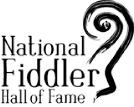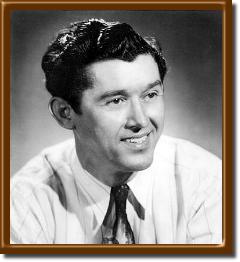|
|
|
|
|
|
|
|
|

Roy Acuff
The National Fiddler Hall of Fame
|

Roy Acuff
YouTube - (Link)
Wikipedia - www.en.wikipedia.org/wiki/Roy_Acuff
Roy Claxton Acuff (September 15, 1903 Ð November 23, 1992) was an American country music singer, fiddler, and promoter. Known as the King of Country Music, Acuff is often credited with moving the genre from its early string band and "hoedown" format to the star singer-based format that helped make it internationally successful. Acuff began his music career in the 1930s, and gained regional fame as the singer and fiddler for his group, the Smoky Mountain Boys. He joined the Grand Ole Opry in 1938, and although his popularity as a musician waned in the late 1940s, he remained one of the Opry's key figures and promoters for nearly four decades. In 1942, Acuff co-founded the first major Nashville-based country music publishing company- Acuff-Rose Music-which signed acts such as Hank Williams, Roy Orbison, and The Everly Brothers. In 1962, Acuff became the first living person to be inducted into the Country Music Hall of Fame.
Early Life
Roy Acuff was born in Maynardville, Tennessee to Ida Carr and Simon E. Neill Acuff], the third of five children. The Acuffs were a fairly prominent Union County family. Roy's paternal grandfather, Coram Acuff, had been a Tennessee state senator, and Roy's maternal grandfather was a local physician. Roy's father was an accomplished fiddler and a Baptist preacher, his mother was proficient on the piano, and during Roy's early years the Acuff house was a popular place for local gatherings. At such gatherings, Roy would often amuse people by balancing farm tools on his chin. He also learned to play harmonica and Jew's harp at a young age. The Acuff family relocated to Fountain City, a suburb of North Knoxville, in 1919. Roy attended Central High School, where he sang in the school chapel's choir and performed in "every play they had." Roy's primary passion, however, was athletics. He was a three-sport standout at Central, and after graduating in 1925, he was offered a scholarship to Carson-Newman, but turned it down. He played with several small baseball clubs around Knoxville, worked at odd jobs, and occasionally boxed. In 1929, he tried out for the Knoxville Smokies, at that time a minor league baseball team for the New York Giants (now the San Francisco Giants). A series of collapses in spring training following a sunstroke, however, ended his baseball career prematurely. The effects left him ill for several years, and he even suffered a nervous breakdown in 1930. "I couldn't stand any sunshine at all," he later recalled. While recovering, Acuff began to hone his fiddle skills, often playing on the family's front porch in late afternoons after the sun went down. His father gave him several records of regionally-renowned fiddlers, such as Fiddlin' John Carson and Gid Tanner, which were important influences on his early style.
Early Music Career
In 1932, Dr. Hauer's medicine showÑ which toured the Southern Appalachian regionÑ hired Acuff as one of its entertainers. The purpose of the entertainers was to draw a large crowd to whom Hauer could sell medicines (of suspect quality) for various ailments. While on the medicine show circuit, Acuff met legendary Appalachian banjoist Clarence Ashley, from whom he learned "House of the Rising Sun" and "Greenback Dollar," both of which Acuff later recorded. As the medicine show lacked microphones, Acuff learned to sing loud enough to be heard above the din, a skill that would later help him stand out on early radio broadcasts.
In 1934, Acuff left the medicine show circuit and began playing at local shows with various musicians in the Knoxville area. That year, guitarist Jess Easterday and Hawaiian guitarist Clell Summey joined Acuff to form the "Tennessee Crackerjacks", which performed regularly on Knoxville radio stations WROL and WNOX (the band moved back and forth between stations as Acuff bickered with their managers over pay). Within a year, the group had added bassist Red Jones and had changed its name to the "Crazy Tennesseans" after being introduced as such by WROL announcer Alan Stout. Fans often remarked to Acuff how "clear" his voice was coming through over the radio, important in an era when singers were often drowned out by string band cacophony. The popularity of Acuff's rendering of the song "Great Speckled Bird" helped the group land a contract with the American Record Corporation, for whom they recorded several dozen tracks (including the band's most well-known track, "Wabash Cannonball") in 1936 and 1937 before leaving over a contract dispute.
The Grand Old Opry
In 1938, the Crazy Tennesseans moved to Nashville to audition for the Grand Ole Opry. Although their first audition went poorly, the band's second audition impressed Opry founder George D. Hay and producer Harry Stone, and they offered the group a contract later that year. On Hay and Stone's suggestion, Acuff changed the group's name to the "Smoky Mountain Boys", referring to the mountains near where Acuff and his bandmates grew up. Shortly after the band joined the Opry, Clell Summey left the group, and was replaced by dobro player Beecher Kirby- best known by his stage name Bashful Brother Oswald- whom Acuff had met in a Knoxville bakery earlier that year. Acuff's powerful lead vocals and Kirby's dobro playing and high-pitched backing vocals gave the band its distinctive sound. By 1940, Jess Easterday had switched to bass to replace Red Jones, and Acuff had added guitarist Lonnie "Pap" Wilson and banjoist Rachel Veach to fill out the band's line-up. Within a year, Roy Acuff and the Smoky Mountain Boys rivaled long-time Opry banjoist Uncle Dave Macon as the troupe's most popular act.
In spring 1940, Acuff and his band traveled to Hollywood, where they appeared with Hay and Macon in the motion picture, Grand Ole Opry. Acuff appeared in several subsequent B-movies, including O, My Darling Clementine (1943) in which Acuff plays a singing sheriff and Night Train to Memphis (1946), the title of which comes from a song Acuff recorded in 1940. Acuff and his band also joined Macon and other Opry acts at various tent shows held throughout the southeast in the early 1940s. The crowds at these shows were so large that roads leading into the venues were jammed with traffic for miles. Starting in 1939, Acuff hosted the Opry's "Prince Albert" segment, but left the show in 1946 after a dispute with management.
In 1942, Acuff and songwriter Fred Rose (1897-1954) formed Acuff-Rose Music. Acuff originally sought the company in order to publish his own music, but soon realized there was a high demand from other country artists, many of whom had been exploited by larger publishing firms. Due in large part to Rose's ASCAP connections and gifted ability as a talent scout, Acuff-Rose quickly became the most important publishing company in country music. In 1946, the label signed Hank Williams, and in 1950 published their first major hit, Patti Page's rendition of "Tennessee Waltz."
Later Career
After leaving the Opry, Acuff spent several years touring the Western United States, although demand for his appearances dwindled with the lack of national exposure and the rise of musicians such as Ernest Tubb and Eddy Arnold, who were more popular with younger audiences. He eventually returned to the Opry, although by the 1960s, his sales had dropped off considerably. After nearly losing his life in an automobile accident outside of Sparta, Tennessee in 1965, Acuff pondered retiring, making only token appearances on the Opry stage and similar shows, and occasionally performing duos with long-time bandmate Bashful Brother Oswald.
In 1972, Acuff's career received a brief resurgence in the folk revival movement after he appeared on the Nitty Gritty Dirt Band album, Will the Circle Be Unbroken. The appearance paved the way for one of the defining moments of Acuff's career, which came on the night of March 16, 1974, when the Opry officially moved from the Ryman Auditorium to the Grand Ole Opry House at Opryland. The first show at the new venue opened with a huge projection of a late-1930s image of Roy Acuff and the Smoky Mountain Boys onto a large screen above the stage. A recording from one of the band's 1939 appearances was played over the sound system, with the iconic voice of George Hay introducing the band, followed by the band's performance of "Wabash Cannonball." That same night, Acuff showed President Richard Nixon (who was in attendance) how to yo-yo, and convinced the president to play several songs on the piano.
In the 1980s, after the death of his wife, Mildred, Acuff moved into a house on the Opryland grounds, and continued performing. In 1991, he was given a lifetime achievement award by the John F. Kennedy Center for the Performing Arts. He died in Nashville on November 23, 1992 of heart failure.
Repertoire and legacy
Many of Acuff's songs show a strong religious influence, most notably "Great Speckled Bird," "The Prodigal Son" and "Lord Build Me a Cabin." Such songs were typically set to a traditional Anglo-Celtic melody, which is most apparent on "Great Speckled Bird" and the 1940 recording "The Precious Jewel." Acuff also liked to perform popular songs of the day, including Pee Wee King's Tennessee Waltz and Dorsey Dixon's "Wreck on the Highway," and even recorded a version of Cajun fiddler Harry Choates' "Jole Blon." Traditional recordings included "Greenback Dollar," which he probably learned from Clarence Ashley while on the medicine show circuit, and "Lonesome Old River Blues," which he recorded with the Smoky Mountain Boys in the 1940s. Acuff and the Crazy Tennesseans recorded "Wabash Cannonball"Ñ another traditional songÑ in 1936, although Acuff didn't provide the vocals on this early recording. The better-known version of the song with Acuff providing the vocals was recorded in 1947.
In 1979, Opryland opened the Roy Acuff Theatre, which was dedicated in Acuff's honor. Dunbar Cave State Park was established in 1973 largely around a recreational area the state had purchased from Acuff. Two museums have been named in Acuff's honor- the Roy Acuff Museum at Opryland and the Roy Acuff Union Museum and Library in his hometown of Maynardville. Acuff has a star on the Hollywood Walk of Fame located at 1541 Vine Street.
Roy Acuff was inducted into The National Fiddler Hall of Fame in 2008.
